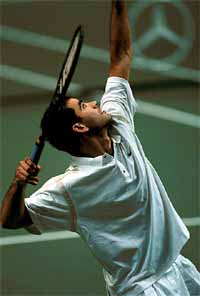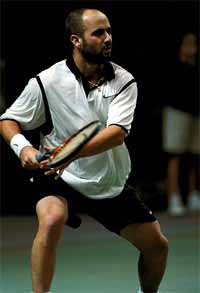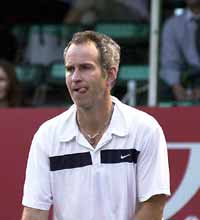Davis Cup Journal: Epilogue
Macís Gone and Davis Cup is Dead
by John Yandell
Yes itís official, McEnroe resigned after only one
year as Davis Cup captain. I was
down in Southern California when I read the news in a Bob Larson
Newsletter special email update, a couple of days before it came out in
the press. But I didnít think the
news was all that shocking.
When I started this journal during the Los Angeles
Davis Cup tie with the Czech Republic earlier this year, I said I hadnít really
cared too much about Davis Cup since Mac quit playing.
For my own selfishóas opposed to patriotic reasonsóI decided to
start following closely again, because I thought if anyone could bring
emotion and significance back to Davis Cup, it was John.
Letís face it, love him or hate him, no player has
ever electrified the game the way John did. I thought there was a good
chance he could translate some of that electricity to the Davis Cup just
by osmosis. If John had actually pulled off what he set out to do, it could
have been pretty thrilling. Pete
and Andre in Australia winning the Cup on grass.
That would be coming up two weeks from now! That could have been the scenario. And I would have had to make the
trip down under to see it. Spain
and Australia in one year sounded good to me.
As it was, we didnít even come close.
I was there in Spain and saw the destruction at close range. Pete
and Andre, however, werenít within 2,000 miles of the place, and neither
one phoned in to say either ďgood luckĒ or ďsorry.Ē

McEnroe sacrificed his tour career to play Davis Cup Today's players
are unwilling to do that.
|
Hey, I loved the tapas, the flamenco, the red wind,
and the quaint medieval towns. And
the Royal Society of Tennisóthe club that hosted the eventóis one of
the most beautiful clubs ever, with itís pristine red clay courts.
But the tennis? That was
pretty tough to take. There was
barely a glimmer of hope going in, and that was smashed after Todd Martin
and Jan-Michael Gambill both lost their first singles matches.
Then you kind of had the impossible dream when the
doubles started the next day, if the U.S. could just win that point,
anything could happen. Or at least Sunday would put some pressure on the
Spaniards. And for a while it looked like Todd and Chris Woodruff might
actually stumble through, though they just didnít play well together.
So when the U.S. ended up losing the doubles in 5 sets, my
photographer and I bailed and went touring, skipping the final singles
matches Sunday.
But we couldnít fully escape. The Davis Cup was right
there on the big screen when we stopped for lunch. And there was John,
sitting there on the sideline, watching Jan- Michael and Vince Spadea get
a further toasting in two meaningless matches.
Man, that was tough to watch for even a few seconds.
I have to imagine sitting courtside for the whole thing was one of
the more tedious and/or painful experiences of Johnís lifeóor at least
his tennis career.
So what happened? What about the Davis Cup dream team? Why did John
resign a $300,000 a year job that had been his dream for about 10
years?
Sally Jenkins, the idiot writer for the Washington Post, took the
opportunity to take a cheap shot at John. "Here he was saying that
players didn't devote themselves to Davis Cup and then he proved himself
right-by doing exactly what he accused them of. He quit because he didn't
care about it enough."
Sally, you may remember, made her career by writing the controversial
and glaringly inaccurate cover story for Sports Illustrated a few years
back that asked the question: "Is Tennis Dying?"
This isn't really the time or place to dredge up everything that was
mistaken in that piece, but suffice it to say her ability to get the facts
right (or lack thereof) remains in tact.
John McEnroe didn't quit Davis Cup because he didn't care enough.
Obviously, it was the opposite, because he cared too much, or just
actually cared. And because he knows a no win situation when he sees
one.
After the disaster in Spain, John was heard to say things like "Agassi
and Pete stiffed me. Those guys just didn't care." I'm sure he felt
that way, but that wasn't the real story. There were just too many other
factors at work.
John McEnroe - although I doubt he would see it
exactly this way - sacrificed his tour career to play Davis Cup.
Remember he won 5 cups and played some of the most unbelievable and
emotionally draining matches of all time. Some
brutal losses on red clay in South America.
And some incredible wins, like the 5-hour indoor match over
Wilander, where he actually let Arthur Ashe hug him after he pulled out
the victory.
People forget one of the greatest doubles matches of
all timeóJohnís last Davis Cup match when he and Pete of all people,
came from 2 sets down to beat Switzerland and set up the team victory by
Courier on Sunday.
I told John recently if he had applied all that
energy to the tour, he might have won another 5 Slam titles. I couldnít
get him to agree, but he did say ďYeah I probably would have won a few
more tournaments.Ē You can pretty much bet on that.
But the tour just wasnít Johnís top priority, and
he was basically finished as a dominant player in the Slams by the time he
was 26.

Pete is almost 30, I donít see how he could commit to both the
tour and the Davis Cup without burning out.
|
Now the point of all this is that Pete and Andre are
both almost 30. They both seem
capable of still winning Slams. Pete
got 4 or 5 of his titles after the age of 26.
But neither one of them played Davis Cup consistently like John.
And if you look at their Davis Cup experience this past year, you can see
the toll it took. Great players shouldnít necessarily be finished in
their mid twenties. But honestly, seeing both Grand Slam events and the
Davis Cup up close, I donít see how any of them could fully commit to
both without burning out.
Watching Agassi win those 2 singles matches versus
the Czechs in LA, I donít think I have seen more intensity,
concentration and focus in a pro match. He
was unbelievable; so inspirational. He
was incredibly dominant, but he was working so hard with his feet, setting
up one shot with another, constructing these incredible geometric points.
The guy had a lot of pressure and it never seemed to get to him.
In fact, it brought out his best tennis.
It was beautiful to see first hand. And when Pete came through to
win the 5th match, well, there was a touch of that old Johnny
Mac magic I had been hoping to catch.
But the aftermath was pretty devastating for the
future of the 'team'. In retrospect
itís hard to apply that term to the U.S. Davis Cup effort in any
meaningful sense of the word. Pete
played hurt during the match, and he was really hurting afterwards.
I know, because I saw him literally dragging his leg behind him out
of the Forum - admittedly with a big smile on his face. But he couldnít walk.
So when he limped through yet another
injury at Wimbledon to win that amazing 12th Slam title, it was
easy for me to understand why he just didnít want to risk the next
terrible physical event, by going immediately to Spain to play in the heat
on red clay. Now some people say he
should have gone no matter what, but heís the only one who knows for
sure what that would have done to him. Pete
just isnít the iron man type to start with.
And, Iím sorry, I donít think any athlete should risk severe or
possibly chronic injury to compete in any event, period. Whether it was
Davis Cup or not isnít really relevant to that decision.
With Andre the after effects were maybe more mental,
even though he had (literally) puked his guts out on the court in Africa
during the first round. Iíve
often heard him say you can only peak so many times a year.
Well, that was a major peak he had there in LA, and you gotta think
it took away from his ability to reach that level later in the Slams. Certainly his results the rest of the year would support that
conclusion. Then there was the
terrible news about his mother and sister.
But Iím not sure even if that hadnít happened, he could have
recovered to play his best at the Open. Think
about it. Four Slams and four
Davis Cup ties a year. Thatís
just too many peaks.
With Andre, you can almost always tell in the first
few games. If he makes some big
unforced errors early, itís a sign that heís not ready to go the
distance. He gets a kind of vacant
look in his eyes thatís obvious when you see him from up close.
People donít realize how much grinding it takes to play his game.
He has to hit a lot of ballsóeven when he finishes the points
with big shots and dominates on score. And
that takes a deep reservoir of mental energy.
Youíd have to say a lot more mental energy than with Peteís
game where basically, nobody can return well enough to even challenge his
service games when heís playing well.

People donít realize how much grinding it takes to play Andre's
game
|
I spoke to John after he won the seniors event at
Stanford a few weeks ago and told him, despite the way it ended, I
didnít think he had really gotten full credit for the incredible level
of energy he put into the whole Davis Cup thing.
ďMaybe I ought to put that energy somewhere else,Ē he said in a
slow, reflective tone. I was pretty
sure right then he was going to quit.
I mean the guy went on Jay Leno and tried to give the
world a history lesson about what was great about Davis Cup, and why
sports fans should actually care. He
did an ungodly amount of other press all the way along.
I told him if he had done a fraction of that to promote the video
we did together in the 1980ís, we would have both made a million
dollars. (Which would have meant
more to me than to him, I can assure you.)
But he didnít think that was too funny.
Iím sure he thought I was off my ass for comparing some
commercial video venture to the Davis Cup.
He also repeated the thing to me about the players
just not caring enough, but then I asked him if he didnít think that
really the problem was the schedule. ď
Donít you think there are just too many people and events that all need
the playersí energy, and not enough juice in the batteries?Ē
ďExactly,Ē he said.
So that looks like it for my little flirtation with
the Davis Cupónot that I minded for a minute.
My conclusion is itís basically dead at the world-class level, at
least on any kind of consistent basis. One
country or another may get the top players together to win in a given
year, but you are not going to see the top players from all the countries
going head to head very often, if ever.
Everyone complains about the tour schedule, but
thatís not going to change. In
fact I believe weíve added one menís and two womenís events for
2001.
I live and breath tennis every day - playing,
coaching, writing - but when it comes to the pro tour, I just donít care
after the U.S. Open. Just the other night I channel surfed right by Lindsay Davenport vs.
Martina Hingis to watch Dark Angel with Jennifer Alba.
It had more dramatic appeal.

John never lacked for confidence, and he was sure he could make
Davis Cup serious again
|
Iíd made the commitment to go to Australia for
Davis Cup final round if the U.S. was in, but now I doubt Iíll even
watch it, even though Spain versus Australia on clay is an interesting
match up on paper. But to me itís
an anticlimax. Without the top
American players and what could have been one of the best American teams
ever, itís just hard to take the whole thing seriously.
John McEnroe has never lacked for confidence, and he
was sure he could make the difference, that is, make Davis Cup serious
again. Iíve heard a lot of
people, including some tour players, criticize him for campaigning so hard
to take the job away from Tom Gullickson, and then dropping it so fast.
And maybe thereís something to that. But really, whatís the
point? Unless America develops some
young superstars really fast, and itís obvious thatís not going to
happen anytime soon, the Davis Cup really doesnít have a chance in this
country right now. And even if that
happened thereís still the multiple demands on the players and the
almost inevitable burnout factor. Howís
that good for the game in the long run?
Now I could be wrong and the next captain might get
Pete and Andre for every match and take it all the way.
But I doubt it. And the long term problems would still be unaddressed and probably
insoluble. One thing is for sure, though, it wonít be the same, without
McEnroe involved. I just wonder
what he is going to do next with all that extra energy.
Your comments are welcome. Let us know what you about think John
Yandell's article by emailing
us here at TennisONE.
|